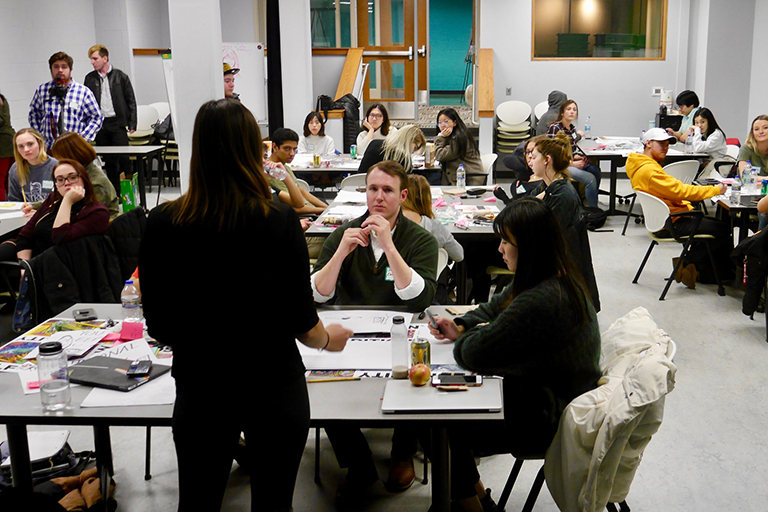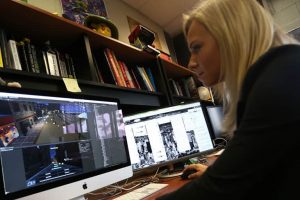Media + Information
Our Programs
Focus and Flexibility
Our faculty has deep expertise in their areas of teaching and research. Through a rigorous process they have designed several tracks that give students a good foundation in the area of focus. Yet, beyond core courses there is flexibility for students to build their skills into deeper specializations.
Game Design and Research
Games, both digital and non-digital, have long been viewed as far more than just entertainment. Interconnected experiences across multiple media platforms such as films, games, virtual reality, mobile apps, and social media all can be used to educate, inform, engage, encourage, and entertain individuals.
The games studies and design program not only looks at the impacts of games and how they can be used, it helps students to gain the skills and experiences to work in this dynamic field. This is a “studio” focused concentration, with the production of media products in collaboration with peers within the concentration, and with undergraduate students interested in working on various dimensions of game studies.
This is a “studio” focused concentration, with the production of media products in collaboration with peers within the concentration and with undergraduate students focused on this area.
Students in this focus would take the follow classes-
MI 830: Foundations of Serious Games (usually offered in spring semesters
MI 831 Theories of Games and Interactive Design (usually offereed in fall semesters)
MI 839: Game and Project Design Studio 1 (usually offered in fall semesters)
MI 846: Game and Project Design Studio II (usually offered in spring semesters)
Students are encouraged to take advantage of the resources and experiences offered from the labs
Human Computer Interaction/ UX

The study of human and computer interaction, with a focus on UX and Usability design is to prepare students and industry professionals for careers in user experience interaction design, usability, and information architecture.
With the pervasive use of information technology across all organizations, these qualifications are highly sought after. Classes emphasize project experience as they cover human-centered design methods, theory and practice. UX research skills are in high demand in many organizations.
This program also prepares students who want to dig deeper into Human-Computer Interaction (HCI) and doctoral level studies to better understand the impacts and how to optimize benefits. Those pursuing an eventual Ph.D. usually chose a thesis as their exit requirement.
Students in this focus would be expected to take the following classes-
MI 831: Theories of Games and Interaction Design (usually offered fall semesters)
MI 841: Understanding Users (usually offered fall semesters)
MI 844: Interaction Design/Socio-Technical Systems (usually offered spring semesters)
MI 845: Usability and Accessibility (usually offered spring semesters)
Students are encouraged to take advantage of the resources and experiences offered in the labs
Media Policy

Information Policy, and Society focuses on understanding the social and economic implications of new media and information technologies and services. It introduces students to current theories and ways of studying media and information, both in the US and from a global perspective, in order to inform research, policy making, and practice. It is ideal for students seeking to pursue doctoral level study or to use media and information for business, government, nonprofits, and society as a whole.
We work closely with the Quello Center whose mission is-
“The Quello Center seeks to stimulate and inform debate on the economic and social implications of media, communication and information innovations of our digital age. Our research is focused on the social and economic implications of communication, media, and information technologies of our digital age as well as the policy and management issues raised by these developments. The Center seeks collaborations with other centers of excellence and stakeholders in research on Internet studies and new media.”
The center often brings in world renown speakers in to discuss topic such as: Information Communication and Technologies (ICTs) & Society; Digital Inequalities; 5G & Digital Innovation; Digital Futures; Internet Governance; and Cybersecurity.
Students in this focus would take the follow classes-
MI 820: Theories of Media and Information (usually in the fall)
MI 850: Media and Information Policy (usually in the spring)
MI 851 Understanding Social Media (usually in the spring)
MI 891 Social Network Analysis (usually in fall)
Students can apply for a optional Information Policy and Society Cognate.
Policy and Society Cognate (9 credits):
A. Both of the following courses (6 credits):
-MI 803 Introduction to Quantitative Research Methods
-MI 820 Theories of Media & Information
B. One of the following courses (3 credits):
-MI 850 Telecommunication and Information Policy
-MI 852 Economic Structures of Telecommunication Industries (as an independent study
Graduates of this program could pursue further studies in a Ph.D. program, work at a non-profit or a think tank.
Students are encouraged to take advantage of the resources and experiences offered from the Quello Center and to become involved in research projects.
Build Your Own Focus

Students in our program are able to build their own focus area that have foundations in the strengths of our program. For example, a student may want to focus on HCI/UX but want to also learn deeply about how playfulness and game design insights deepen engagement. Or for students who want to focus more deeply in any of our research areas.
Students work closely with their faculty advisors to build a personalized study program. Students are required to take five of the core classes. Classes should include theory, methods, and classes to build expertise in the goal area. An example of a possible plan of study is-
MI 803: Introduction to Quantitative Research Methods
MI 820: Theories of Media & Information
MI 841: Understanding Users
MI 850: Media & Information Policy
MI 839: Game & Project Design Studio 1
MI 846 Game & Project Design II
